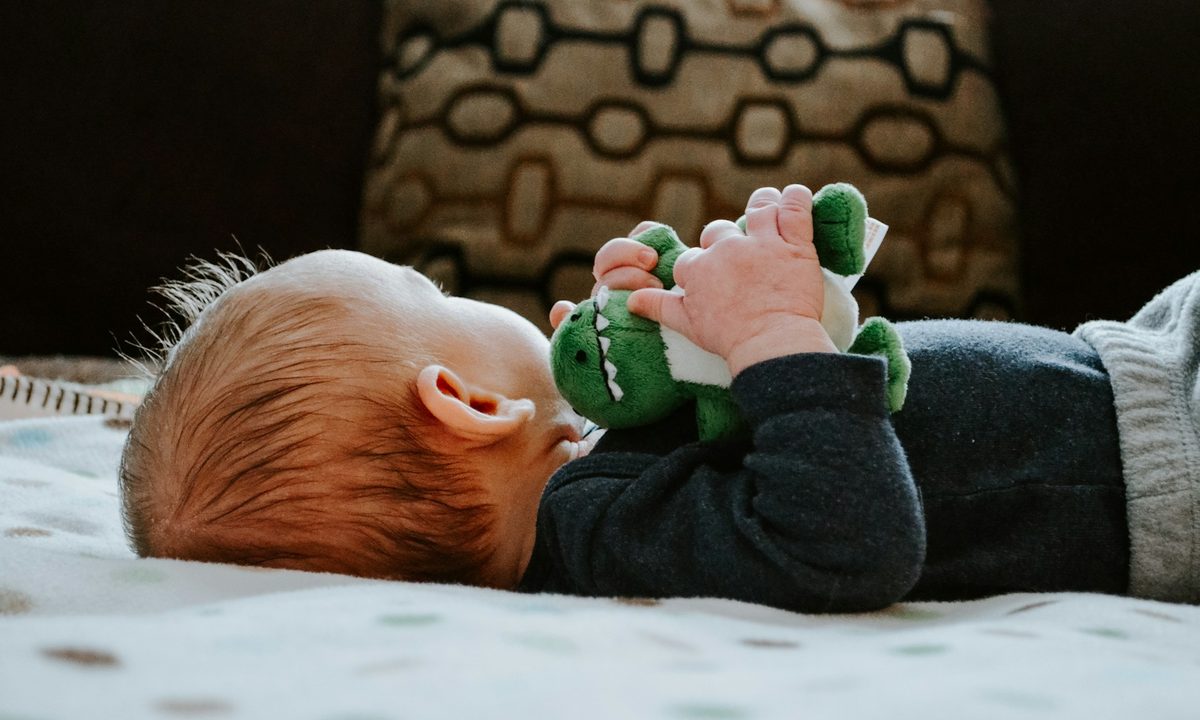New parents have an endless amount of questions when they bring their new baby home for the first time. Aside from eating and sleeping, there are lots of different and often bizarre behaviors babies exhibit that can cause any new parent confusion. Babies, though soft, snuggly, and sweet-smelling beings, are known to be confusing and stressful little creatures sometimes, especially if you are on your first. In between the diaper changes, nighttime feedings, and recovery from childbirth, it’s easy to be overwhelmed and stressed out, especially when your baby is doing things you never expected them to do. Like, is your baby constantly kicking legs and moving arms? Where did that come from?
Don’t worry. Many of those bizarre movements and strange quirks of behavior no one covered in your parenting class or prenatal appointments are totally normal and most of the time they’re nothing to be concerned about. Here are a few of the strange and wonderful things babies do that may seem odd but are actually completely normal. If you see your little one constantly kicking their legs and moving their arms, it doesn’t mean something is wrong. Here’s what your little one’s quirks mean.
Bizarre baby behaviors that are normal

A baby’s first year could be characterized by strange behaviors you weren’t even aware of, which might be a thing. It’s not something veteran parents tend to talk about, and it probably wasn’t a chapter in all the baby books you read while pregnant. There are a few unusual behaviors, like constantly kicking legs and moving arms and even hiccups, that babies will do that are totally normal. These strange baby behaviors crop up and usually go away on their own. Let’s go over some of the things you might see your tiny tot doing.
Crossing their eyes
When babies are first born, they’re still learning how to control all their parts, eyes included. If your bundle of joy seems to go cross-eyed frequently, it’s most likely nothing to worry about. They’re just learning how their eyes work. Similarly, when young babies sleep, sometimes their eyelids don’t close all the way or at all, and you may see their eyes moving rapidly back and forth. This is what we look like when we’re in the REM phase of sleep. It’s perfectly normal, and you likely wouldn’t even notice it if your little angel’s eyes were closed.
Making jerky movements
One of the most common questions new parents have involves their baby’s jerky limb movements. If your baby is constantly kicking their legs and moving their arms or making jerky movements, it’s totally normal.
The Moro reflex or startle reflex is characterized by a sudden movement of arms or legs in response to stimuli, like a door closing or a dog barking. It is unsettling for new parents when their newborn’s arms or legs suddenly go rigid, but it’s a normal reflex that typically disappears by about two months of age. If you think your baby’s Moro reflex is severe or otherwise concerning, don’t hesitate to take a video to show your pediatrician.
Gagging
As your little one ages and starts solid food, you might notice gagging when they eat. It is a scary sight, and many parents assume their baby is choking. Gagging when starting solids is a typical developmental quirk and happens as babies learn to manipulate food with their tongues. The motion brings food forward into the front of their mouth and helps them learn to chew.
In a younger baby, gagging might be a sign the flow of milk or formula entering their mouth is too fast. If your little one gags on the bottle or breast, consider changing the bottle nipple size or expressing your milk after letdown occurs. Gagging is also a sign of acid reflux in infants, so if your baby continues to gag after you’ve addressed any flow issues, you should mention this to your pediatrician at your next wellness visit.
Smiling
While it’s adorable to see a smile on your baby’s face, the fact is until they’re about four months old, babies don’t actually smile. Sorry, parents. That little grin you see peeking out of the swaddle probably means your newborn has gas. It’s not uncommon for infants to form a smile when they’re trying to relieve some pressure, but don’t worry, they’ll start smiling at you in earnest soon.
Constantly dropping things
When babies are young, if they drop a toy, they assume it’s gone forever and may be surprised when you hand it back to them. That’s because they haven’t yet developed the concept of object permanence — the idea that just because you can’t see something doesn’t mean it stops existing. At around six months, object permanence begins to develop. Little ones commonly begin dropping or throwing anything they get their hands on just to see it return like magic when you hand it back to them.
Don’t worry — there’s likely nothing wrong with their hands or grip. However, if they continue dropping things after around 15 months old or seem to be dropping things frequently but unintentionally, it might be worth mentioning to your pediatrician.
What those flailing limbs could also be doing

On the move
If your little bundle is really working out those legs and arms, new parents need to be ready for take-off. Old pros know that when a baby starts kicking and moving more than usual, they are about ready to roll over and test out their mobility.
If your child hasn’t started rolling yet, then these movements are signs your baby is gearing up to roll. If your child is already rolling, the next step is crawling. Veteran parents know the signs, but new parents might not know what’s coming.
Colic is making an appearance
While your baby learning how to move is a fun explanation for those limbs going crazy, there’s a not-so-fun reason for your little one’s movements. As early as two or three weeks old, your baby could develop colic. If their constant leg kicks and arm flails are accompanied by excessive crying, look to see if they have other symptoms typical with colic. Those flails might be signaling this condition.
If your baby does have colic, know that it usually lasts a few weeks, with the average age of it stopping around 6 weeks old.
When to contact your pediatrician

You should never hesitate to contact your pediatrician if you’re worried about your infant, but there are some signs that you shouldn’t ignore. Babies will cry often, but the experts at Nationwide Children’s Hospital suggest contacting your pediatrician “If your baby is continuously fretful and fussy, cries for long periods or very suddenly, or has a cry that sounds unusual,” noting it may be a sign of illness. How your baby sleeps can also be a sign of illness, especially if you have trouble waking them, if they’re sleeping more than normal or if they’re acting less alert than usual.
Having your new baby home and in your arms is everything. You’ve been waiting for this moment for months and it’s finally here. A baby constantly kicking and moving arms isn’t anything to stress over. It’s important to know, though, that if you’re concerned, pick up the phone and call your pediatrician. That’s what they’re there for. A phone call to your baby’s doctor will ease your mind if you’re stressed about any bizarre baby behaviors you weren’t aware of. Pediatrician offices are prepared to field worried questions from anxious new parents.
All in all, having a new baby is a complete mystery to a new parent. It’s unsettling to see your baby constantly kicking and moving arms or gagging. Luckily, most of the bizarre things they do are normal developmental quirks that will pass with time. If one of the quirky behaviors persists or you have concerns, err on the side of caution and reach out to your pediatrician. But, otherwise, enjoy learning about your child and getting to know all of the things that make up their personality — flailing limbs included.



